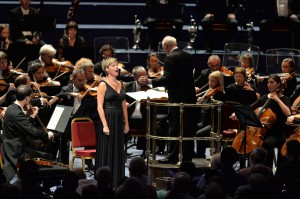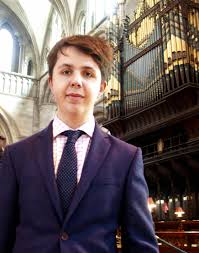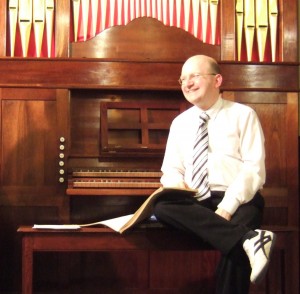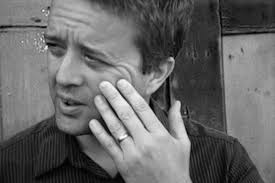Monthly Archives: August 2014
CBSO: Wagner & Elgar
Birmingham Symphony Hall, 25 August 2014
Klaus Florian Vogt is probably the finest Wagner tenor we have today. There may be one or two other contenders for the position but few who have the heady lyricism combined with the sheer power to thrill the largest of venues.
His strongest characters over the last few years have been Lohengrin and Parsifal, and the evening drew on these. After a very subtle reading of the Good Friday Music from Parsifal under Andris Nelsons, he sang Amfortas! Die Wunde! and Nur eine Waffe taugt, the first so fresh and vulnerable that the pain of Kundry’s kiss seemed eminently real and the final narration radiated nobility as well as the cleanest of diction.
Changing the mood rather drastically we heard the concert version of the Prelude to Act3 of Lohengrin followed by two narrations also from Act3. Hochstes Vertrau’n proved to be heroic as well as deeply human, but it was the glorious outpouring of In fernem Land that galvanised the evening. His lingering over eine Taube, the high clear tones seeming to melt into the air around him, was breathtakingly beautiful. If only we had been able to hear at least the whole of one act, rather than these truncated sections.
Unfortunately this was the one slight draw-back of the evening. I had thought that we had disposed of bleeding-chunk concerts almost fifty years ago, and Wagner is now normally performed, if not whole, then at least in significantly large units and without sudden-death endings. Surely it would have been possible here to have created segues between the items to allow at least the three Parsifal pieces and the two from Lohengrin to be linked without the trauma of sudden endings and bursts of applause?
No such problems after the interval where we heard Elgar’s Second Symphony. The opening movement had great urgency with the music coming to us in warm waves of sound which made the quieter sections all the more poignant. Throughout, Andris Nelsons drew attention to the militaristic under-pinning of so much of the score, with its hints of violence and destruction beneath the potential for celebration. The second movement took this in its stride with a sense of both nobility and loss, looking backwards rather than dare to look ahead. However the future stares us in the face in the driven fury of the Rondo where odd moments of calm don’t last and the military percussion is ever present. The final movement brought some relief but often seemed on a knife-edge as if everything could still go wrong at any moment. A fascinating reading which made much of the wide dynamic range of the hall.
Before the Elgar, Andris Nelsons spoke to us about harpist Robert Johnston who, after 42 years’ service with the orchestra, was giving his final performance in this country before retirement. Alongside the anecdotes, he praised not only Robert’s long service with the orchestra but the sense of community within the orchestra itself which has seen a large number of conductors over nearly half a century while managing to retain its own sense of continuity and integrity.
BPO Summer series: 4
Unitarian Church, Brighton, 24 August 2014
Christine Messiter joined the regular string players for the final concert in the summer series, rounding off the afternoon with a bright and fast paced reading of Mozart’s Flute Quartet K285. The brief second movement allows the flute to indulge itself in a lyrical development which floats above pizzicato strings before the more buoyantly brisk Rondo finale.
The performance had opened with Mozart’s Dissonance Quartet, its slow opening section poised between Haydn and Beethoven, a dichotomy which Mozart relishes as the work progresses. Rich, often very dense writing, suddenly flowers into the lightest of lyrical moments. The warmth of the Menuetto gives way to a rather old-fashioned but none the less attractive Allegro molto which has just enough fire to challenge us.
Between them came the premiere of a work by a Sussex composer – in this case Adam Swayne’s Reaches. Written for string quartet, the nine short pieces flow in to each other to trace the course of a day at sea. The composer’s introduction was helpful in pointing out key ideas though the work is atmospheric rather than narrative. The regular use of pizzicato, often against long held notes on a single instrument, was very effective and the slap of strings against the shifting shimmer and sense of openness was moving. The piece is dedicated to Leo Dawkins and, as with other works in this summer series, let us hope it is not the last time it is heard.
The quartet have done a very fine job this summer bringing us a wide range of familiar works alongside more challenging recent compositions. The large and very responsive audience at each event shows there is a real appetite for concerts like these and let us hope they return next summer.
The Winter season of the Brighton Philharmonic Orchestra opens at the Dome on 5 October with works by Glinka, Rachmaninov and Shostakovich. www.brightonphil.org.uk
Prom 47
21 August 2014
It was inevitable that we would find Britten’s War Requiem at this year’s Proms and after the superb performance by BBCSO last autumn I had expected a repeat with those forces. However, last night we heard the CBSO with the BBC Proms Youth Choir under Andris Nelsons. The same conductor and orchestra recorded the work in Coventry Cathedral, with different soloists, for the fiftieth anniversary of the first performance in 1962. That last night did not come up to the levels of either of these was obvious but the reasons were not as easy to detect.
The opening sections seemed oppressive, almost melancholic and despairing, with the boys’ choir so far removed as to be unemotional. Only the first conclusion, with its finely resolved cadence brought any hint of peace. Both of the men, Toby Spence and Hanno Muller-Brachmann, have warm voices but neither had the cutting edge to chill us with the impact of Wilfred Owen’s verse. Recalling both Peter Pears and Philip Langridge one was aware of the sort of sound Britten expects here. One ever hangs and the conclusion of So Abram rose were effective but other moments went for less than anticipated. Susan Gritton has a soprano to carry over the large orchestral forces and the Lacrimosa and Libera me both made a fine impact.
The Choral forces had a brightness of tone which was pleasing but lacked the precision and cutting edge the work requires. There were also some strange tempi. The Dies Illa after Be slowly lifted up seemed unnecessarily slow and calculated, lacking the emotional impact the score seems to require.
The final passages of the Libera me brought back the melancholic despair of the opening which was not countered in the final pages. The most poignant moment came with the reference to better men and greater wars as if Owen could sense the on-going bleakness of human existence.
At the end, Andris Nelsons held an extended silence, almost uncomfortably long. There are times when performances naturally require a time to recover before we applaud but this seemed to be out of keeping with what we had actually heard. An uncomfortable evening then, but perhaps, this year of all years, a good thing.
Tower Brass at Holy Trinity
Holy Trinity Church, Hastings, 20 August 2014
Tower Brass may be an ad-hoc group of local professional brass players but they caused quite a stir at yesterday’s lunchtime concert. From behind a screen at the far west end of the building they opened with a transcription of Mr Valiant for Truth from Vaughan-Williams’ Pilgrim’s Progress arranged for them by Roger Wilcock. This electrifying start led to a series of pieces spread around the building. Monteverdi’s Domine ad Adiuvandum – familiar as the opening sinfonia from Orfeo- came from east and west ends, Palestrina’s Jesu, Rex Admirabilis from the south aisle and Pitoni’s Cantate Domino from deep in the chancel. But of these roving performances perhaps the most thrilling was Gabrielli’s Sonata Piano’e Forte with its fine antiphonal and echo effects ringing round the church.
Experimentation is always welcome even if it sometimes fails. An arrangement of Bach’s D minor Toccata, normally an organ piece, was one such. Given that it was almost certainly written for solo violin its transmission to brass ensemble became somewhat ponderous. A pity for what followed returned us to the immediacy of the earlier works. An arrangement by Jim Alexander of Rheinberger’s Abendlied using the soft voices of three flugelhorns was wonderful and segued effortlessly into a fine horn solo in Jeanie with the light brown hair. El Gato Montes brought us into the world of the bull-fight and demonstrated the fine articulation of the players.
The concert ended with The Saint’s Hallelujah – a combination of the Alleluia Chorus and When the Saints Go Marching In – and a chance for all the players to show off their improvisatory and jazz skills.
The highly enthusiastic welcome should hopefully ensure they are encouraged to return.
All Saints Organ Concerts 7
Stephen Disley; 18 August 2014
Stephen Disley has become a familiar face for the regular Hastings audience. He did not disappoint on this occasion, presenting a varied selection of music, introducing the items with interesting anecdotes and humour.
WT Best’s transcription of Handel’s Overture to the Occasional Oratorio made for a fiery start to the proceedings, followed by two pieces by Buxtehude. The prelude on Durch Adams fall ist ganz verdebt could perhaps have been slightly better balanced by using a softer solo stop against the beautifully restrained accompaniment. The dramatic Praeludium in G minor provided a good selection of well registered contrasting sections stylishly delivered. Durufle’s arrangement of Sanctify us by Thy goodness by Bach was given a sensitive performance with flutes and clarinet. Two pieces in the English Cathedral tradition brought the first half to a regal conclusion – Norman Cocker’s Tuba Tune and Walton’s Crown Imperial.
The second half contained less familiar music but to my mind was more musically satisfying. Two movements from Whitlock’s Plymouth Suite (Andante Tranquillo & Toccata) were followed by a haunting rendition of Agnus Dei by Martin. Harris’ Fancy was a welcome demonstration of light-hearted whimsy and was followed by the large scale Variations de Concert by Bonnet.
Stephen began the evening by pointing out the need for restoration work to be carried out on the Willis – something performers are becoming more and more aware of. In light of the current state of the organ (the action has become extremely heavy) it would make sense for organists to adjust their approach to concerts here accordingly. Stephen is not the first organist this season who would have benefitted from slightly slowing his pace and working with a more legato approach in order to give the mechanism time to respond. There were a number of occasions during the programme when pipes were hardly sounding – a real shame as Stephen is an excellent performer.
He concluded the evening with an unashamedly schmaltzy rendition of The Londonderry Air. Building from a gentle introduction to a huge American theatre style climax this piece sent the audience happily on its way. I hope he will be back again soon. SP
Prom 40
Saturday 16 August 2014
A delight as always to welcome Bernard Haitink to the podium and a surprise to find that so renowned a Mahlerian should be conducting the 4th symphony for the first time at the Proms. The combination of Mahler’s Fourth and Schubert’s Fifth Symphonies may look somewhat strange on paper but they work remarkably well in performance. Both symphonies were overlooked for many years and it was not until Charles Grove reintroduced the Schubert in the early years of last century that its popularity began to grow, and enthusiasm for Mahler was only just beginning when I started going to the Proms in 1960. What is more, neither symphony requires trombones, understandable in Schubert but unexpected in Mahler.
Bernard Haitink did not go out of his way to stress the similarities but they grew out of the performances. Though tempi in the Schubert were on the fast side there was an intimacy, a delicacy, throughout which was captivating. The hints of early Beethoven – Schubert’s own orchestra had played the first two symphonies – are there alongside the more obvious Mozart, but above all, the later Schubert is there in essence.
The approach to the Mahler was equally relaxed with wind solos particularly impressive – a lovely bassoon solo in the first movement. There was an innocence to the second movement despite the occasional tensions, but these never resolved themselves into threats. The gentle inevitability of the slow movement was spell-binding with details subtly etched but never over-spun. Camilla Tilling was the soloist for the final movement drawn from Des Knaben Wunderhorn. The programme note implied a potential dichotomy for the composer faced with a vision of heaven which includes death and even Herod, but this has always seemed to me to be the magnificence of the vision which is so inclusive it is forgiving of all. Heaven – this seems to say – is for everyone without judgement, and so it seemed to be for us.
All Saints, Hastings
11 August 2014
Jonathan Allsopp is about to take up an organ scholarship at Durham Cathedral while studying at Durham University. On the strength of his concert at All Saints yesterday evening he will be a fine asset to the cathedral and its music.
The first half focused on baroque compositions and his choices throughout confirmed a very fine ear for registration on the Willis, reflecting a North German sound world. The Sinfonia from Bach’s Wir danken dir Gott had a lightness of touch and impressively fluid articulation which belied the weight of the action. There were lovely echo effects in the opening movement of CPE Bach’s third sonata in F and again highly sympathetic registration.
Just as we were getting lulled into a baroque comfort-zone we were gently nudged back to reality with Zsolt Gardonyi’s Mozart Changes a tongue-in-cheek arrangement of a Mozart piano movement which slips easily into jazz improvisation. As Jonathan has a real feel for jazz it would be good to hear more of this from him.
Byrd’s Fantasia BK46 brought us back to a more austere atmosphere though it was never acid, and Bruhns challenging Praeludium in E minor with its chromatic writing and sudden shifts of mood and dynamic, rounded off a most impressive first half.
The second moved us into the romantic period, opening with Guilmant’s Sonata No3 Op5. Suddenly we were in the world of Cavaille-Coll and the heady string sounds of the late nineteenth century. The central Adagio was particularly telling and prepared us for the gentle flutes of the Romance from Vierne’s 4th Symphony.
In a subtle piece of programme planning the troubled simplicity of Vierne’s Romance flowed easily into Maxwell Davies’ familiar, but welcome, Farewell to Stromness. Although the Willis can’t provide the nasal bag-pipe sound the work seems to yearn for, the soft voicing was very effective.
Edward Marsh’ Toccata sur le theme ‘Pat le facteur’ proved to be more in keeping with the earlier part of the programme than expected. While a gentle spoof, playing with the theme from Postman Pat, the work is obviously based on the Toccata from Boellmann’s Suite Gothique and consequently quite at home with Guilmant and Vierne!
At the start of the programme we had been promised fairies and we got these in the encore with a delightfully light Dance of the Sugar Plum Fairy from the Nutcracker.
Marion Lovell had taken a risk engaging Jonathan Allsopp effectively sight unseen. As so often, her instincts were spot on and I hope we hear from him again very soon.
Next Monday 18 August, Stephen Disley.
Stephen Page: 3
Hastings Unitarian Church, Saturday 9th August 2014
It could have been embarrassing to almost run out of chairs and programmes, but in fact on a day when we expected competition from other attractions like Rural Past Times, it was wonderful to see the Meeting Place full to capacity. This was the third in our summer series of organ recitals, and we were delighted to see many new faces in the audience, as well as welcoming back many regular supporters.
As always, Stephen treated us to an eclectic mix of items, from the known and loved – a Bach Prelude and Fugue, a Brahms Chorale and Rodgers’ Carousel Waltz – to unknown compositions such as a lively sixteenth century Scottish dance with the beguiling title Kinloch his (lang) pavane! Handel featured in both categories, with his popular Largo and a lesser known combination of Overture, Entrée and Gavotte from his Aylesford Pieces.
Stephen’s love of the Snetzler organ is infectious, and he always takes pride in demonstrating its potential. Eric Thiman’s Trumpet Tune and Air allowed us to hear the Hautbois stop masquerading as a trumpet, while Percy Whitlock’s reflective Lantana gave the delicate Dulciana stop its voice. Comer’s Hors d’oeuvres saw the Snetzler transformed to a theatre organ, set our toes tapping, and demonstrated considerable dexterity and the technique of thumbing down! CPE Bach’s Sonata in G minor was the recital’s longest work, allowing us to appreciate much of the organ’s versatility within the one piece.
The balanced and varied programme was held together by a lively, informative and often amusing commentary which added to the audience’s enjoyment. A pleasing moment of intimacy was Stephen’s tribute to two organists of considerable seniority in the audience to whom he owed his early inspiration.
The last concert in this year’s series will be on Saturday 11th October at 2.30pm. CE
BPO Summer Season 3
Brighton Unitarian Church, Sunday 10 August 2014
Recent works by Rob Lane formed the heart of the third summer concert last Sunday the first of which, Evocations, was commissioned by the Brodowsky Quartet in 2012. Dedicated to Rosalind Kelly, the work shifts across a number of musical memories as if the listener is recalling a distant if elusive past. The strongest section is the central dance motive, finely focused in contrast to much of the rest of the work, which often seems to be just beyond our grasp. It would be worth hearing again if only to unpick the obviously sensitive internal connections.
Three poems by Sylvia Plath formed the second item by Rob Lane and were here being given their first performance. Edge is by far the most successful setting, its simpler lyricism seeming closer to the text and a more direct emotional experience for the listener. Mirror has an angularity to it which distances us from the text, possibly intentionally as the mirror itself seems devoid of emotion. A gentle waltz underpins Morning Song though its warmth rarely moves into the vocal line.
The instrumental setting for these songs was almost inaudible at times given the power of Katie Thomas’ voice. This was a problem throughout the afternoon, affecting the concluding Mozart. When she sang more quietly or in the lower register the voice was pleasing, but in the upper register and at greater volume the intensity of sound was simply uncomfortable and often painful. I am sure her voice would be fine in a far larger venue, but within the close confines of the Unitarian Church it needed reigning back to maintain comfort for the audience.
The afternoon had opened with a warmly spirited reading of Mozart’s Hunt Quartet K458, and concluded with his Exsultate Jubilate, which was enjoyable for most of the time, given the concerns noted above.









